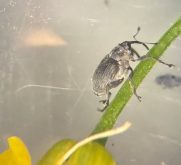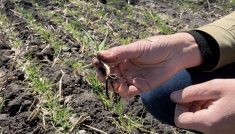China’s demand that Canada start delivering certified blackleg-free canola starting Nov. 15 will be tough to fulfil because the fungus disease is common here, says Canola Council of Canada president JoAnne Buth.
But she says the Canadian government and canola industry are working hard to restore access to one of Canada’s major canola customers.
Last crop year, Canada exported 2.6 million tonnes of the oilseed to China making it Canada’s biggest export customer. However, historically sales to China have varied.
A Canadian delegation of experts from the Canadian Food Inspection Agency and Agriculture and Agri-Food Canada were to arrive in China this week to try and address China’s concerns while maintaining Canada’s access.
Read Also

Tie vote derails canola tariff compensation resolution at MCGA
Manitoba Canola Growers Association members were split on whether to push Ottawa for compensation for losses due to Chinese tariffs.
Chinese buyers have cancelled at least two cargoes of Canadian canola for November and December shipment. Buth declined to speculate Monday on what would happen if they failed.
“Our main goal is for the (Canadian government) delegation at the very minimum to negotiate an extension (from Nov. 15) in order to work out some of the details and hopefully reverse the decision or find a different path,” she said.
ICE Canada November canola closed down four per cent Oct. 22 with traders saying China’s new import restrictions led to the drop. Meanwhile, the price of Chinese-produced canola increased leading some observers to speculate the restriction, which also applies to Australian
“Our main goal is for the (Canadian government)
delegation at the very minimum to negotiate an extension (from Nov. 15) in order to work out some of the details and hopefully reverse the decision or find a different path.”
– JOANNE BUTH
canola (but as of last week not American) is a non-tariff trade barrier. Adding to that speculation is the fact that Canadian canola seed is not grown in China, but crushed for its oil and meal. Blackleg affects neither.
Buth said it’s difficult to know whether China’s new requirements are legitimate or a means to block imports. China acknowledges blackleg exists there, but officials claim the strains are not virulent.
“There have been times when we have gotten quite a bit of cooperation (from China) and I’m hoping this is going to be one of those times as well,” she said.
“There has to be quite a bit of discussion about how China can minimize the risk of any blackleg being spread from Canadian canola.”
One industry source said it’s rumoured China is retaliating because of Canadian restrictions on imports of Chinese honey.
Buth praised the federal government for acting so quickly.
“Clearly it’s an important issue for us so we really appreciate the fact they are taking this seriously,” she said.
“The industry and the government are really committed to working on this together.”
Agriculture Minister Gerry Ritz told Reuters last week Canada grows the best canola in the world and the Canadian government will stand up for Canadian growers.
Canada’s swift dispatch to China of officials was welcome news to farmers, said Todd Hames, an Alberta canola grower and official with the Canadian Canola Growers Association.
Canadian Embassy officials are already in contact with their Chinese counterparts, CFIA spokesman Tim O’Connor told Resource News.
“We want to highlight that this is not a food safety issue, rather it is a trade and market access issue,” O’Connor said.
Chinese buyers have already booked more than one million tonnes of new canola crop from Canada, said one trader with an international trading house in China.
Traders said that China’s restrictions would stop imports completely. Chinese buyers said they did not dare to book more cargoes.
Chinese quarantine authorities have not informed buyers in China and could not be reached immediately for comment.
“Some cargoes cannot be washed out, who will take them? We would see how authorities tighten inspection,” said one Chinese buyer.















